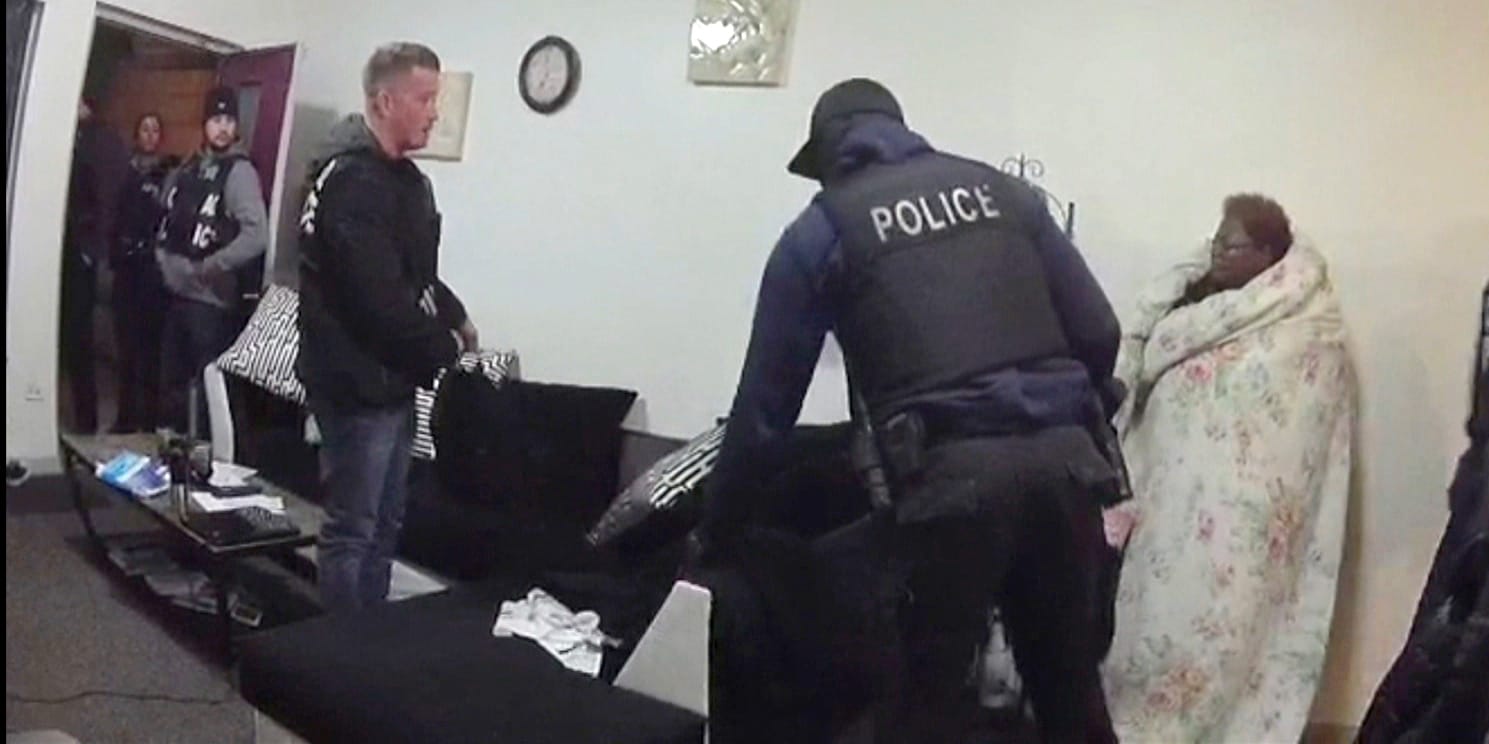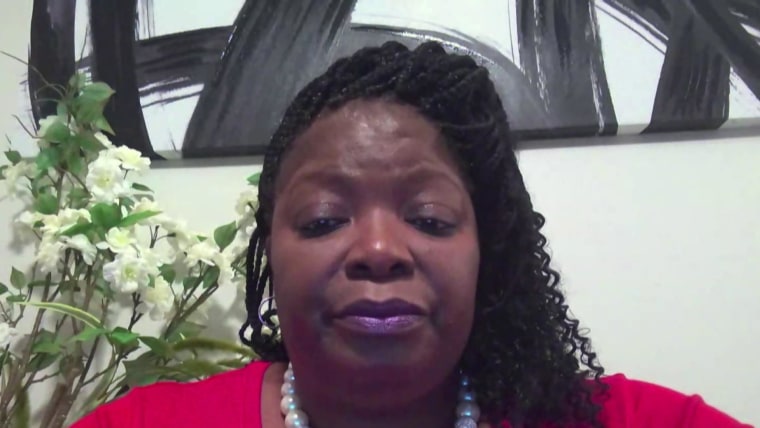On Feb. 21, 2019, Anjanette Young arrived home from her job as a social worker and began to undress for bed. Suddenly she heard the deafening sound of Chicago police slamming their battering ram against her front door.
For nearly 40 minutes, unclothed and unprotected, confused and now unsafe in her own home, Young repeatedly told the officers that they had the wrong home.
For nearly 40 minutes, unclothed and unprotected, confused and now unsafe in her own home, Young repeatedly told the officers that they had the wrong home. In fact, police were acting on an unverified tip by a confidential informant that there was a person at her address in possession of a gun and drugs. But that person, a 23-year-old fitted with an electronic monitoring device, did not live there and had no connection whatsoever to Young. After a prolonged and dehumanizing period of time for Young, police apparently realized their mistake. A sergeant offered an apology and the police left, attempting to fix her door on the way out.
But they didn’t leave her alone. Chicago police and city officials fought to suppress the truth of what happened that night and cover up the unnecessary violence and trauma they inflicted on an innocent citizen just trying to get ready for bed. And they almost succeeded. After Chicago officials learned that CBS was set to air a special using the body camera video (with Young’s consent), the city asked a judge to block the video and asked for sanctions against Young’s attorney. Fortunately, those efforts failed and CBS ended up running the story. Now, Chicago Mayor Lori Lightfoot is calling for accountability. But would she have done so if her legal team or police officers had been success in burying the facts?
Here is the sad reality: Chicagoans are not surprised. For those of us who work within the criminal justice system, as defense attorneys, what happened to Anjanette Young that night is the norm. What is unusual, however, is the fact that in this case there may actually be accountability, due in large part to the existence of body camera video.
But we also must acknowledge how Young’s innocence and class are connected to her believability as a victim. Change one of these factors — if they had the right house, if the victim was not a professional, if she was using or dealing drugs — and maybe we would all be less concerned about her trauma. Her experience would be consistent with the logic that assumes Black women should be treated with suspicion. And, most likely her experience would never be made known to the general public.
Imagine for a minute if there were no body cameras. How far would this story go? The police get to decide when to turn their cameras on or off, and although there are police directives and state laws in place to prohibit officers from doing so, few officers get in trouble for concealing or obscuring the record. In fact, based on my 13 years of experience, attorneys often have to fight to get access tp material evidence that their clients are entitled to in preparation for trial.
Change one of these factors — if they had the right house, if the victim was not a professional, if she was using or dealing drugs — and maybe we would all be less concerned about her trauma.
In Young’s case, her legal team received additional body-worn camera recordings nearly two years after the incident, and only after extensive news coverage and public consumption of Young’s assault. Cameras are still not mandatory for all Chicago Police Department law enforcement personnel who interact with the public. Gang enforcement units routinely surveil neighborhoods without being required to wear body-worn cameras. This is highly problematic, given that it is routine for an individual’s freedom to come down to their word against an officer’s.
In a criminal case, every benefit of the doubt is still given to the police. Starting with the arrest, the criminal justice system works to push a guilty plea. And this pressure mounts the longer you are in the system. People experience a seemingly endless court process — whether detained before trial, confined at home on electronic monitoring, or released. An open criminal charge is a burden that results in loss of work and extraordinary stress and strain.
Adding to this coercive atmosphere, prosecutors withhold evidence while people face mandatory minimums and other harsh sentences at trial. As a result, people overwhelmingly plead guilty (nationwide 95 percent of convictions come from guilty pleas), whether guilty or innocent, whether the victim of police misconduct or not. The result? Criminal records, as well as the insulation of police misconduct. Such guilty pleas preclude public defenders from cross-examining officers and bringing most civil rights lawsuits. In short, the dynamics of the court process keeps the general public from knowing the truth; it perpetuates a system of injustice.
This is the normal course of the criminal justice system. Victims and the accused are dehumanized, and many of them are moved through the system in complete silence. The state decides how their stories are told and what forms of accountability are just. Neither the victims nor the accused are centered in any processes of healing or transformative rehabilitation. This doesn’t make us safer or healthier. In fact, it undermines the very stated goals of the criminal legal system
Ida B. Wells, one of Chicago’s most best known and moat beloved civil rights leaders, once said, “The right way to right wrongs is to turn the light of truth upon them.” But what happens when we continue to suppress truth?
Astoundingly, this cover-up has occurred under a mayor, a County Board president and a state’s attorney who are all Black women, a fact that shows us just how systematic and prevalent these issues are.
Not shockingly, government officials are now pointing fingers at one another. With the resignation this weekend of Mark Flessner, corporation counsel for the city of Chicago, the search for the proverbial bad apple continues. All the while, reform efforts continue to ignore calls for systematic change.
Among restorative justice advocates, the powerful symbolism of the mythical Sankofa bird is well known. The Sankofa bird can’t move forward without being able to account for the past. As we spend time looking back in order to move forward, we should keep history centered, especially the history of decades of “law-and-order” policy and police violence. This is particularly true in a city like Chicago, whose police department is infamous for its brutality and racism, including the torture over 100 Black men.
This means rather than relying exclusively on the police to keep Chicago safe, we need to invest in the services that will make our communities healthy.
This means rather than relying exclusively on the police to keep Chicago safe, we need to invest in the services that will make our communities healthy and stop over-funding police departments at the expense of other vital functions. This also means redistributing public safety dollars to invest in local grassroots, nonpolice organizations to respond to emergency calls.
In the interim, at minimum, we need to require that body camera and dash camera video be stored externally and ensure civilian oversight structures have direct access to it. And if cameras or video are tampered with or unavailable, judges, prosecutors and ultimately juries and other oversight bodies should be instructed to view that fact as evidence that whatever was in the video would have supported the victim’s version of events in civil and criminal proceedings involving police officers.
Chicago is not a war zone. Cook County residents like Anjanette Young are not enemy combatants. The outrage over Young’s home invasion and assault and the subsequent cover-up is well placed and cannot be met with simple reform fixes. Her story and the stories of countless others before her — both known and unknown — must help point us forward toward a future that does more than make empty promises about “reform.”
Source: | This article originally belongs to Nbcnews.com











